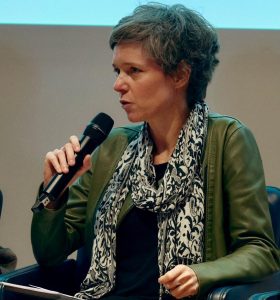
I am a tenured Senior Researcher at the Department of Humanities at University of Luxembourg, Program Director at the Collège International de Philosophie in Paris (2025-2031) and an Associate Member of the Centre Georg Simmel at EHESS. I am currently completing my habilitation under the supervision of Prof. Rainer Maria Kiesow (EHESS, Paris).
In my work, I explore the dialectical interplay between symbolic and imaginary foundations of our culture and technological-medial progress, with a special focus on blockchain technology and generative Artificial Intelligence.
I examine the ideological foundations of blockchain- and AI-driven legal and societal innovations, such as code-governed decentralized organizations, virtual property regimes, and predictive or decentralized justice, showing how these emerging technologies are reshaping traditional notions of law, governance, and subjectivity.
A major part of my scholarship has involved translating and interpreting the works of Pierre Legendre whose dogmatic anthropology was the focus of my doctoral thesis. My theoretical approach to questions of law, technology and society, has been complemented by a long-term experience at a bi-national Paris law firm, where I worked as a translator and gained direct insight into both French and German legal practice. Based on this combination of practical expertise with a multidisciplinary education in law, legal philosophy, and German and French literary, linguistic, and cultural studies, I have developed a distinctive research approach that bridges philosophical analysis with legal, media, and cultural theory.
Research residencies at the Institut d’Études Avancées in Nantes (2018-2019) and at the Weizenbaum Institute in Berlin (2022) have provided valuable opportunities to challenge and refine this approach. My research has resulted in numerous scholarly publications and media appearances, in media outlets such as Le Monde, Revue Esprit and France Culture. I have also been invited to provide policy advice to prominent institutions, including the Foresight Center of the European Commission, the Federal Council for Sustainable Development in Belgium, and the Paris Bar Association.
Research Interests
My research is guided by the following core questions, which explore the dynamic intersections of law, culture and technology:
- How do individuals become subjects within societal structures? To what extent are they entangled in rigid normative frameworks, and how can they either break free from them or actively shape these structures? What roles do language, law, and technology play in these dynamics of autonomy and constraint?
- How are traditional notions of binding obligations and authority transforming when institutions become transnational or decentralised? What do these changes mean for established models of governance and social cohesion?
- What impact does digitalisation have on social dynamics and the institutional (textual) fabric of our society? How does the striving for more autonomous, virtual and disembodied forms of life reshape our cultural foundations and concepts of subjectivity? Does this shift erode traditional social contexts, or does it give rise to new forms of community and new social bonds?
- What are the ideological underpinnings and the cultural and legal implications of blockchain technology? How does its promises, such as that of „decentralized justice“ or „self-sovereign identity“, transform the legal landscape? What are the impacts on the foundational principles of our legal and cultural system, and what risks accompany these innovations?
- How does the deployment of artificial intelligence in legal systems, educational settings and political processes transform the individuals‘ (text-based) relationship to society? What are the implications of these shifts for the core dynamics underpinning democracy and the rule of law?
- What roles do the body (broadly understood, i.e. the human body, textual corpus, materiality, and nature), time, and nature play in all this?
Publications (selection)
- « NFT-Fashion and Virtual Self Re-Creation », Navigationen – Zeitschrift für Medien und Kulturwissenschaften, 25/1 (2025), Media Cultures of Value | Economy, Politics, and Art in Web3, Johannes Bennke, Mirjam Schaub (Eds.), Siegen: universi 2025, p. 89-102.
- « ‚I produce language, therefore I am‘: Rethinking education in AI-Capitalism », Berliner Gazette, 28.03.2025.
- Katrin Becker, Pierre Musso (Eds.), Pierre Legendre. Einführungen in sein Werk, transl. from French by Katrin Becker, with contributions from Katrin Becker, Livio Boni, Peter Goodrich, Paolo Héritier, Pierre Musso, Osamu Nishitani, Andreas Rahmatian, Serene Richards, Weilerswist: Velbrueck Wissenschaft 2024.
- « Blockchain Matters – Lex Cryptographia and the Displacement of Legal Symbolics and Imaginaries », Law and Critique Vol. 33 (2022), p. 113-130.
- « Göttliche Protokolle, Bitcoin-Jünger und schattenhafte Herrscher: Über die religiösen Anwandlungen und ideologischen Verstrickungen der Blockchain-Technologie », Jahrbuch für Technikphilosophie. Kunst und Werk, Nomos-Verlag 2022, p. 177-194.
- Numérique : avec le Covid-19, « la présence physique s’est avérée soudainement porteuse d’une dimension politique », Le Monde, 20.11.2020.
- « Corona und die krisenhafte Wiederkehr des Verdrängten », Zeitschrift für Kulturphilosophie, ZKph 2020/2, p.111-122.